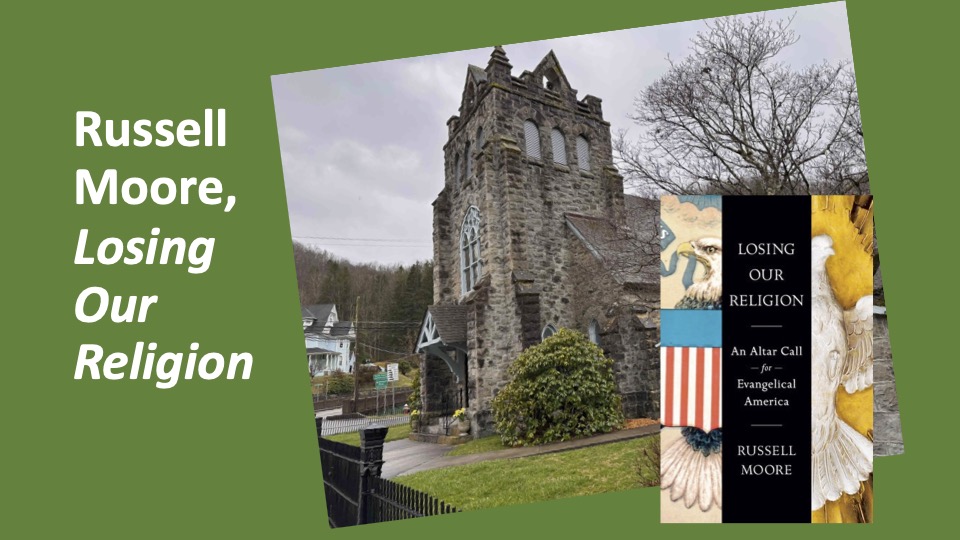Russell Moore, Losing Our Religion: An Altar Call for Evangelical America (Sentinel/Penguin Random House, 2023), 256 pages, no illustrations and (sadly) no index.

I have followed Russell Moore from a distance for the past decade, finding him a voice of compassion and reason within the Southern Baptist Convention. It was sad to watch as he was pushed out of his leadership role. But I rejoiced when he became the editor-in-chief for Christianity Today. After the publication of this book, it quickly rose to the top of my to-be-read pile. I appreciate the grace Moore displayed in these pages, even as he deals with those who see him as an enemy.
Moore acknowledges his book title is a riff off the hit song of the same name by the band, REM. But then, as he notes, we’re not called to a religion. We’re called into a relationship with Jesus Christ. We confess him publicly as Lord and Savior and strive to follow him in our lives.
This book is part memoir. The author describes his experience in the Baptist tradition, starting when he walked down to the altar to commit his life to Christ. He noted that at such an early age, he had no idea as to where his commitment would lead. He told about those who called for Bill Clinton’s head after his affair within the White House. The leaders of the church took the moral high road with Clinton. However, many of the same leaders fell under the spell of Donald Trump. He recounted his battles within the Southern Baptist Convention after he refused to endorse Trump, a man he felt morally unfit to be President.
A personal note: I don’t think preachers and religious leaders should endorse any candidate. But this is not a hard and fast rule. When candidates behavior and rhetoric are an affront to the values of our faith, we should speak up. Think of the Old Testament prophets. Furthermore, when candidates attempt to misled the faithful, as “wolves in sheep clothing, we have an obligation to challenge and to protect the faithful. Moore has been especially good at remaining focused on Jesus while challenging such dangerous ideology.
Moore did not hold back his opinion, especially after the events of January 6, 2021. He took offense at those who stormed the capital with signs reading, “Jesus Saves.” He noted the religious aspect behind the failed insurrection, which included the “Jericho March” that brought a religious theme with the same falsehood about the election before the riot.. Moore acknowledges that many faithful pastors found themselves blindsided when they spoke out against such misuse of the Christian faith. Reading this book, I continually kept going back to the Sunday after January 6. I recalled three people getting in my face that Sunday, before I could leave the chancel, upset that I had challenged the blasphemy of those using Jesus’ name in a riot. Click here to read my sermon from that day.
With additional issues such as sex abuse coverup within the leadership of the Southern Baptist Convention, Moore exposes an evangelical church enthralled with human power. He acknowledges that Christian leaders are always sinful, and the church has always dealt with the problem of hypocrites. But because the evangelical church appears to have sold out to power politics, he questions the church true allegiance. Is it to Jesus?
In five detailed chapters, Moore speaks of the church losing its credibility, authority, identity, integrity, and stability. He engages in many of the topics battered around in church circles these days including deconstructionism, tribalism, the cultural wars, hypocrisy, and nostalgia for what we fear to have lost. We can gleam much from Moore’s insights. He offers suggestions on how we can grow as Christians in each area. While Moore vision of the church he loves has grown larger than just the Baptist denomination of his youth, he does long for the church to experience a Baptist-like revival. But he also warns the church not to attempt to come up with its own program to revive American evangelicalism. To do so, the church would risk “reviving” the wrong thing and miss out on God’s true revival.
Moore uses himself as an example of one growing in the faith. In the early years of this century, he attacked fellow Baptist Beth Moore (no relationship even though he joked about her being his mom) for her stance of women in leadership. He has since become a friend of hers and acknowledges his earlier defense of male leadership is not the major issue of scripture as he once thought.
In addition to appreciating his insights, I realized many of the same authors influenced Moore and as well of me. Two of these include the poet David Wythe along with Wendell Berry. Moore tells a favorite story of mine from Berry’s Jayber Crow, in which Troy questions radical teachings which turn out to come from Jesus’ Sermon on the Mount. I have used this story in several sermons including this one from April 2022.
I recommend this book. The prophets of today, who raise questions about our allegiances, are no different than those in Biblical times. While Moore may not end up like Jeremiah, in a cistern, he has had his share of battles. Yet he remains gracious to others, including those with whom he disagrees, all while striving to be faithful to his Savior. Having committed himself to Christ, he realizes our hope is not in human power. Our hope is in God, who revealed his power in the weakness of the cross. (See 1 Corinthians 1:18-19).
Let me leave you with a quote: “Christian nationalism is a prosperity gospel for nation-states, a liberation theology for white people.” (page 117)


My first break with the church–more a permanent fracture–was when they used their bully pulpit to get involved in my politics. That’s not what I want them for. I got that, flawed though I may be (as is every human). What I don’t got is God.
Our hope is for God to get us, not the other way around. Politics and churches is a difficult topic. I’ve just finished reading Erik Larsons, “In the Garden of the Beast” about the American ambassador to Germany from 1933-37, at a time when a prophetic voice was needed, but what few there were found themselves dead or sidelined.
I’m glad you liked the book.
Thanks, Mary.
I can’t wait to read this! I’m a big fan and like you, was thrilled when he became editor of CT. I recently finished “The Kingdom, The Power and the Glory” by Tim Alberta, a great narrative about evangelicals and their unlikely alliance with Donald Trump. Alberta interviewed Russell Moore for the book and he is featured prominently. I’m part of a church that would be considered “evangelical” but I am so weary of that term and all its connotations. Russell Moore reminds me there is sanity among the brethren.
I have read reviews of Alberta’s book, but haven’t read it. I am glad for voices like Russell.
He sounds like an open-minded and fair person. I certainly agree with him on his assessment of Trump.
He is well spoken and seems to have a solid grasp of current events along with Biblical and Theological understandings.
This sounds like an excellent book! As a long-time follower of Beth Moore, I’ve witnessed (online) their friendship and collaborations in recent years.
Whether I get to it any time soon or not, this is going on my wishlist.
I received Beth Moore’s recent memoir and it’s in my TBR pile.
Wow, this sounds like a powerful book. I love your final quote. I have often wondered how many entitled white people ever stop to consider how much they’re cheating even themselves by clinging to such elitist principles.
That final quote I pulled out of the book is quite powerful, isn’t it?